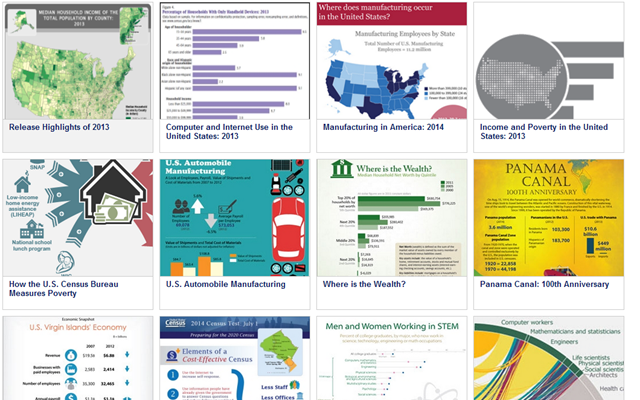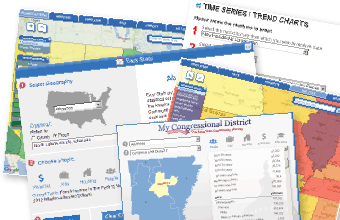Tip Sheet Number 11 — May 30, 2025
Upcoming
2025 Product Calendar
The Census Bureau has posted anticipated release dates for each regular and recurring statistical product scheduled for release in 2025. These products are listed in the Census Bureau’s online product calendar, which is updated as needed throughout the year.
Demographic
Detailed Languages Spoken at Home and Ability to Speak English for the Population 5 Years and Over: 2017-2021
The U.S. Census Bureau is set to release a new table package that provides data on over 500 individual languages and language groups spoken across the country from 2017 to 2021. Detailed Languages Spoken at Home and Ability to Speak English for the Population 5 Years and Over: 2017–2021 presents national and state-level trends based on data from the American Community Survey (ACS). This is the third tabulation the Census Bureau has released beyond the 42 languages and language groups published annually, updating a package released in 2015. (Scheduled for release June 3.)
Household Trends and Outlook Pulse Survey
The U.S. Census Bureau has expanded data collection for the experimental Household Trends and Outlook Pulse Survey (HTOPS) to almost 30,000 households. This expanded sample size will allow for data to be released at a subnational level. Launched in January, HTOPS is a successor to the Household Pulse Survey (HPS). HTOPS will continue the strong tradition of the HPS by providing rapid insights into national events that have socioeconomic impacts on U.S. households.
Economic
Weather Events & Economic Landscape: Data and Tools for Disaster Recovery
Join us for the Exploring Census Data Webinar on Weather Events & the Economic Landscape: Data and Tools for Disaster Recovery. Gain insights from experts at the Census Bureau’s Center for Economic Studies and Emergency Preparedness and Response Team. Discover how to access essential economic, demographic and resilience data. Engage with our experts during the Q&A segment. (Scheduled for June 5.)
2023 Nonemployer Statistics Marine Economy
The U.S. Census Bureau is set to release the 2023 Nonemployer Statistics (NES) estimates of the U.S. Marine Economy. Nonemployer Statistics provide economic data for businesses that have no paid employees, are subject to federal income tax, and have receipts of $1,000 or more ($1 or more for the Construction sector). Nonemployer establishment counts and receipts estimates will be provided by nonstandard state- and county-equivalent geographies (comprised of selected coastal regions across each state, and by the Economics: National Oceanic Watch (ENOW) sectors, defined by the Office for Coastal Management at the National Oceanic and Atmospheric Administration (NOAA). The ENOW sectors include tourism and recreation, ship and boat building, marine construction and transportation, offshore minerals, and living resources such as fishing. (Scheduled for release June 18.)
Inventors and the Allocation of Talent
The U.S. Census Bureau and the Local Employment Dynamics (LED) Partnership in collaboration with the Council for Community and Economic Research (C2ER) and the Labor Market Information (LMI) Institute, welcomes Nathan Goldschlag as he presents, “Inventors and the Allocation of Talent.” Join us for an insightful webinar exploring two groundbreaking research papers that reveal surprising trends by linking U.S. patent documents to Census Bureau microdata on people, jobs, and businesses. The first paper finds a significant share of inventors are foreign born, have highly skewed earnings, and are less likely to start new businesses while the second paper shows that from 2000 to 2016, more inventors were employed by large, established companies and tended to produce less impactful patents. (Scheduled for June 18.)
2023 County Business Patterns
The U.S. Census Bureau will release the 2023 County Business Patterns (CBP), which provides annual subnational economic data for businesses with paid employees. Data are available at the national, state, combined statistical area, metropolitan/micropolitan statistical area, county, congressional district and ZIP code levels, and includes data for Puerto Rico and the Island Areas at the state and county-equivalent levels. (Scheduled for release June 26.)
Commodity Flow Survey Provides Data on the Nationwide Shipment of Goods
The U.S. Census Bureau is scheduled to release data from the 2022 Commodity Flow Survey. The survey, a partnership with the U.S. Department of Transportation, Bureau of Transportation Statistics, is the primary source of national, state and selected metropolitan area statistics on domestic freight shipments. It provides information on the origin and destination, value, weight, mode of transportation and distance of commodities shipped. Data are available for the nation, 50 states and the District of Columbia, and selected metropolitan areas. (Scheduled for release June 26.)
2025 Local Employment Dynamics (LED) Save the Date (September 3-4)
Join us for the 2025 Local Employment Dynamics (LED) Partnership Workshop, a hybrid event bringing together data users, researchers and policymakers to explore the latest in employment dynamics and workforce analytics. This year’s sessions will spotlight updates to the Longitudinal Employer-Household Dynamics (LEHD) data products and tools, including new features, enhanced capabilities and innovative applications. Whether attending in person or virtually, participants will gain valuable insights into using LED data for decision-making, planning and policy development. Virtual attendance is open to all participants. In-person attendance is limited to Washington, D.C. metro area federal and state partners. Mark your calendars and stay tuned for registration details coming soon. Further details and an agenda, when available, will be posted on the LEHD website. Information on previous workshops can also be found on the LEHD Workshop and Webinars page. Email questions about the workshop to <[email protected]>.
Business Trends and Outlook Survey
The Business Trends and Outlook Survey (BTOS) measures business conditions on an ongoing basis. BTOS experimental data products are representative of all employer businesses in the U.S. economy, excluding farms. The data allow greater insight into the state of the economy by providing continuous, timely information for key economic measures. Data are released biweekly and are available by sector, state, employment size and the 25 most populous metropolitan statistical areas.
Monthly Business Formation Statistics
Business Formation Statistics (BFS) provide timely, high-frequency data on business applications and employer business formations monthly. The data are available at the state, regional and national levels, and by industry sector at the national level. The next monthly BFS will be released June 11 and will include May 2025 data. Business Formation Statistics - Release Schedule (census.gov).
Recently Released
(Released since May 16, 2025)
Economic
2022 Economic Census – Product Statistics Update
May 29 — The U.S. Census Bureau released statistics about products and services from the 2022 Economic Census. The release includes two tables, one presenting data on products by industry and the other data on industries by product. Data provided will include the number of establishments and the sales, value of shipments or revenue by product codes. Products are categorized based on the North American Product Classification System and industry data by the North American Industry Classification System.
2024 Annual Survey of Public Pensions
May 29 — The U.S. Census Bureau released the 2024 Annual Survey of Public Pensions (ASPP). The ASPP provides revenues, expenditures, financial assets and membership information about defined-benefit public pension systems. Defined-benefit plans provide a specified benefit in retirement.
Facts for Features
Asian American, Native Hawaiian, and Pacific Islander Heritage Month: May 2025
March 19 — This month-long observance of Asian Americans and Pacific Islanders started more than 25 years ago. We celebrate their growing contributions to our nation with a host of demographic and economic statistical information about the Asian American, Native Hawaiian and Pacific Islander Heritage.
America Counts: Stories Behind the Numbers
America Counts tells the stories behind the numbers in a new and inviting way. We feature stories on various topics such as families, housing, employment, business, education, the economy, emergency preparedness and the population.
Stats for Stories
Stats for Stories provides links to timely story ideas highlighting the U.S. Census Bureau’s newsworthy statistics that relate to current events, observances, holidays and anniversaries. The story ideas are intended to assist the media in story mining and producing content for their respective audiences.
Resources
Emergency Management/Disaster Resources
When major disasters strike, visit our Emergency Management webpage for demographic and economic data on impacted areas. Each disaster will include data from our key emergency management tools: OnTheMap for Emergency Management, Community Resilience Estimates, Census Business Builder: Regional Analyst Edition and other useful resources.
Learn What Surveys Are Being Conducted in Your Community
Discover which of the Census Bureau’s 130-plus annual surveys are being conducted in your community. In a variety of surveys and censuses, evolving from the first census in 1790, the Census Bureau provides official information about America’s people, businesses, industries and institutions. Learn more about surveys currently being conducted in each Census Bureau region:
Data Tools
Below are a few of the Census Bureau’s interactive applications used to access statistics from our 130-plus annual surveys. A complete list can be accessed on the Census Bureau’s Data Tools and Apps webpage.
Community Resilience Estimates (CRE) — The CRE tracks how socially vulnerable every single neighborhood in the United States is to the impacts of national and local disasters.
Business Dynamics Statistics (BDS) Explorer — Analyze the Business Dynamics Statistics (BDS) data through interactive charts, maps and tables.
Justice Outcomes Explorer Data Tool — Justice Outcomes Explorer (JOE) data measure the economic and health outcomes of people who have been involved with the criminal justice system.
Training Opportunities
Census Bureau Training Opportunities
Webinars are available on a regular basis to help the public access and use Census Bureau statistics. These free sessions, which are 60 to 90 minutes each, show users how to navigate Census Bureau databases and mapping tools and find demographic and economic statistics at the local or national level. Descriptions of upcoming sessions are available on our Census Academy webpage. Login details are provided at least one week before a webinar.
- Weather Events and Economic Landscape: Data and Tools for Disaster Recovery (Thursday, June 5, 2-3 p.m. ET)
- Census Data for the U.S., States and Counties (Thursday, June 5, 2-3 p.m. ET)
- Mapping Made Simple: A data.census.gov Guide to Maps (Tuesday, June 17, 2-3 p.m. ET)
- The Research Agenda for the 2030 Census Disclosure Avoidance System (Monday, June 23, 3-4 p.m. ET)
- Comparing Income and Poverty Data from the ACS and CPS ASEC (Wednesday, June 25, 2-3 p.m. ET)
- Using Labor Statistics to Make Informed Decisions (Thursday, June 26, 2-3 p.m. ET)
- Good Data Come in Small Geographies (Thursday, June 26, 2-3 p.m. ET)
Archived Training Resources
Visit the Census Bureau’s Educational Resource Library for previously recorded, free training available at your convenience. The library includes presentations, recorded webinars, tutorials and other helpful materials.
###





